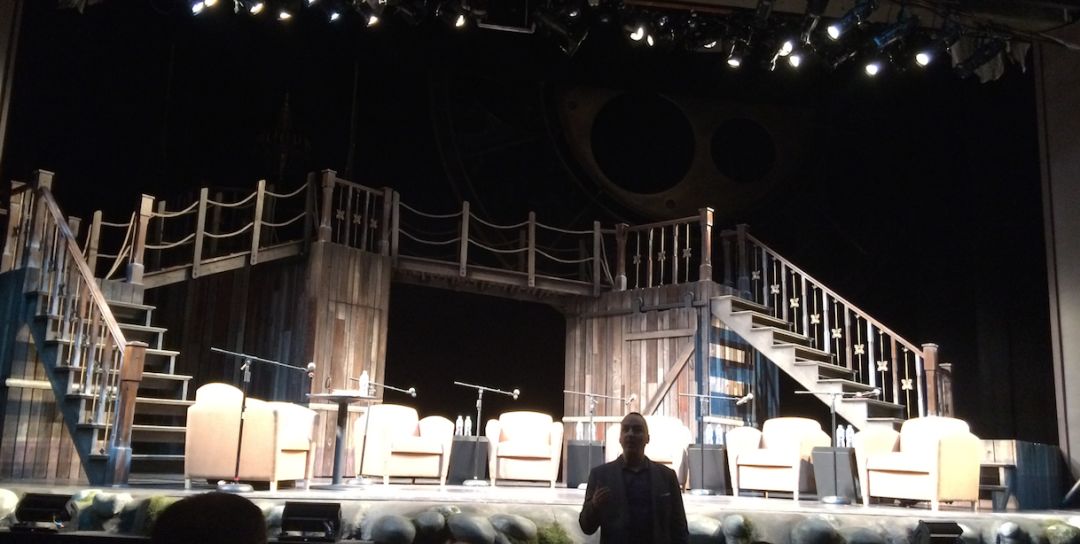Promises, Promises: Five City Government Candidates on the Arts

Hot seats: The stage at the Gerding Theater awaits the arrival of the candidates and Oregon Public Broadcasting host April Baer.
Image: Fiona McCann
With the 2016 primaries still four months away, Portland's candidates for mayor and City Council are tweaking positions and honing their schtick. It's prime time, in other words, for the city's arts community to apply a little pressure—and get some commitments on record.
That was clearly the motive of those packing the Gerding Theater on Tuesday, January 26, with Portland's arts elite showing up in force for a "candidates forum on arts and culture" hosted by Oregon Public Broadcasting. Moderated by State of Wonder host April Baer and taped for weekend broadcast, the forum aimed to illuminate how, exactly, five current front-runners would engage Portland's arts community if elected. In the hot seats: for Portland Mayor, Ted Wheeler and Jules Bailey; up for City Council: Amanda Fritz, running unopposed for Commissioner position No. 1, and Stuart Emmons and incumbent Steve Novick, for position No. 4.
Over the course of the 90-minute debate, a few clear themes emerged amid the blandishments and redirections. Among them, a uniform distancing from the arts lite approach of current Mayor Charlie Hales, and an emphasis on Portland's superheated real estate market, positioned as the aggravator of—and potential solution to—an arts scene increasingly desperate for shelter.
Who emerged as Portland's best bet for an arts champion? To our ears, just one victor emerged, and they weren't on stage. Rather, kudos go to the critical mass of arts advocates and practitioners in the audience—muscle that, this early in the race, should win the arts a place on the electoral agenda, and demonstrate that the community is concerned about the city's cultural life.
Did the candidates take the temperature of the room? We're hopeful, given these takeaways:
1) Arts liaisons in the mayor's office: bring 'em back. Both Bailey and Wheeler said they'd reinstitute former Mayor Sam Adams' in-house arts and culture liaison. (Hales discontinued the staff position when he took office.)
2) Mayoral candidates on the Arts Tax: let's enforce. Both also agreed that four years in, the city's Arts Tax is great! But not so great—principally because without enforcement (read: a collections agency), the fund isn't large enough to "get to the people."
3) City Council candidates on the Arts Tax: let's reform. Both Fritz and Novick concurred that the Arts Tax's flat-rate, limited-exemption structure has proved burdensome for many residents. Says Fritz: "I'm not interested in sending a collections agency after someone making $20,000. I am, however, very interested in doing so for someone making $2 million."
4) Jules Bailey: greater mandate for city's creative laureate. For Sam Adams' final act as Mayor, he appointed North Portland photographer Julie Keefe as Portland's first creative laureate—a "cultural ambassador" position that Bailey would like to see furthered empowered to engage Portland's business community in the arts.
5) Emmons' big idea: arts organizations buying their buildings? The Portland architect offered few specifics during his time on the mic. One crowd-pleasing exception? His suggestion that given an increasingly volatile renters' market, the city could—and should—play a role in helping local arts organizations purchase their homes.
6) Wheeler's big idea: we can fund that. "Big Brains" Wheeler—as we just might start calling him—later seized on Emmons' suggestion with a rather wonky (and certainly very specific) fix: a financing vehicle currently in the city's toolbox that could allow for the creation of a fund dedicated to low-interest loans and mortgage assistance. Did we get that right, Wheeler? If so, we're impressed.
7) Wheeler's next big idea: get tough on diversity. Baer pressed each candidate on how they might address the enduring lack of diversity in Portland's arts scene. Most candidates responded with calls for more conversations. Wheeler took a different tack (as he put it himself), abruptly suggesting that the city make diversity—or at least an enforceable diversity plan—an absolute requirement for arts organizations receiving city money. Way to upstage the competition, Wheeler! Now, if only there were a way to add diversity to this race. Maybe (just a thought!) by inviting Sarah Iannarone, Fred Stewart, and Chloe Eudaly—you know, the other candidates—to join the conversation.
